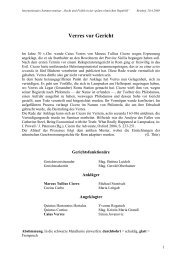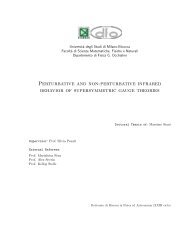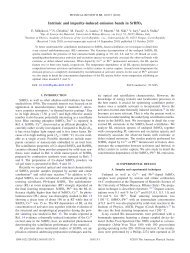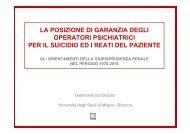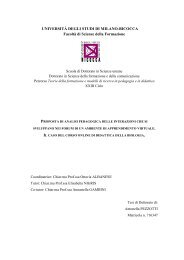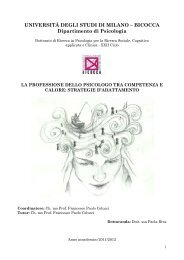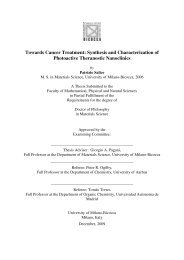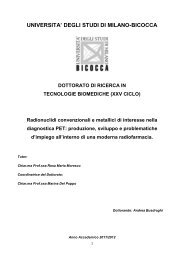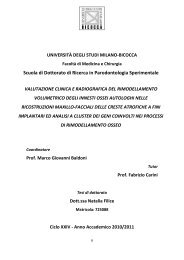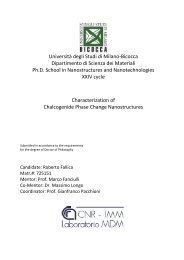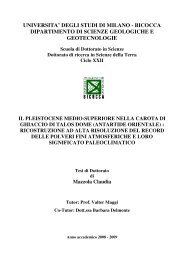- Page 1:
Diritto romano e diritti della anti
- Page 4 and 5:
CAPITOLO SECONDO FUNZIONE 1. Funzio
- Page 6 and 7:
4.3. Il ius tutoris dandi dei duovi
- Page 8 and 9:
perché ritengo che in essa si rive
- Page 10 and 11:
Per tali motivi, anche la tutela de
- Page 12 and 13:
propria tutela muliebre applicata a
- Page 14 and 15:
CAPITOLO PRIMO EPOCA ARCAICA E DECE
- Page 16 and 17:
Le fonti pervenuteci riconducono le
- Page 18 and 19:
mancanza di questi, i gentili 10 .
- Page 20 and 21:
di impedire la costituzione della m
- Page 22 and 23:
Flaccus quasi ad ipsum hereditas pe
- Page 24 and 25:
A mio parere, quindi, non si deve e
- Page 26 and 27:
Gai.1,165: Ex eadem lege XII tabula
- Page 28 and 29:
donna nei confonti della famiglia d
- Page 30 and 31:
Da sottolineare che, in questi prim
- Page 32 and 33:
interpretatione coangustatum est ve
- Page 34 and 35:
Altra parte della dottrina 48 prefe
- Page 36 and 37:
Da un altro punto di vista Sacchi h
- Page 38 and 39:
4. Natura originaria della tutela.
- Page 40 and 41:
ed eredità ab origine. Questa tesi
- Page 42 and 43:
medesimo, raffigura un quadro che n
- Page 44 and 45:
mancanza di fonti 68 , mantiene fer
- Page 46 and 47:
sarebbe, quindi, una parvenza resid
- Page 48 and 49:
dissolvendo per lasciare spazio ad
- Page 50 and 51:
muliebre o il conseguimento di un
- Page 52 and 53:
legittimo era irrinunciabile 87 . I
- Page 54 and 55:
particolarmente gravoso a causa del
- Page 56 and 57:
diritto, basato sulla sua aspettati
- Page 58 and 59:
posta in essere dall’erede post a
- Page 60 and 61:
È molto significativo che Gaio abb
- Page 62 and 63:
cui vogliamo verificare l’attendi
- Page 64 and 65:
liberorum loco sunt; si sui heredes
- Page 66 and 67:
L’Imperatore, anche nel Codex, me
- Page 68 and 69:
eni non uscivano dalla parentela ag
- Page 70 and 71:
5.2. Testamenti factio passiva. Se
- Page 72 and 73:
L’opinione dottrinale ad oggi pre
- Page 74 and 75:
che la mancipatio familiae sia stat
- Page 76 and 77:
…Communi iure familiam dicimus om
- Page 78 and 79:
itiene che, come il singolo coerede
- Page 80 and 81:
poteva anche non avvenire 152 , poi
- Page 82 and 83:
CAPITOLO SECONDO FUNZIONE 1. Funzio
- Page 84 and 85:
avesse compiuti i quattordici anni
- Page 86 and 87:
Inoltre aggiungo che se il tutore e
- Page 88 and 89:
putant hanc speciem dandi tutoris i
- Page 90 and 91:
stabilì che il terzo a cui la donn
- Page 92 and 93:
condizione libertina sarebbe stata
- Page 94 and 95:
mutuo passivo sine tutore auctore.
- Page 96 and 97:
potevano disporre del solo reddito
- Page 98 and 99:
dell’introduzione del testamentum
- Page 100 and 101:
pronunciate durante una fase prelim
- Page 102 and 103:
Un fenomeno storico peculiare al mo
- Page 104 and 105:
dell’errore di un compilatore pos
- Page 106 and 107:
Quanto al riferimento gaiano alle X
- Page 108 and 109:
emancipatione ac sine capitis minut
- Page 110 and 111:
La fanciulla destinata al sacerdozi
- Page 112 and 113:
sembra, sarebbe stata libera dalla
- Page 114 and 115:
d.C.: levitas animi, imbecillitas f
- Page 116 and 117:
sia impuberi che puberi. Si riporta
- Page 118 and 119:
Il giurista motiva l’esclusione d
- Page 120 and 121:
senno e di carattere, che faceva di
- Page 122 and 123:
mulier. Tale aiuto poteva far comod
- Page 124 and 125:
D.26,2,1pr.(Gaius, libro duodecimo
- Page 126 and 127:
Monaco 272 , sulla base dell’anal
- Page 128 and 129:
forme di tutela, come ad un unico i
- Page 130 and 131:
CAPITOLO TERZO MEDIA E TARDA REPUBB
- Page 132 and 133:
I giuristi sopracitati spiegano che
- Page 134 and 135:
Se il patrono o il filius patroni,
- Page 136 and 137:
Solazzi 288 ha sostenuto che la nec
- Page 138 and 139:
quo minus cum eo agatur, cogi eum a
- Page 140 and 141:
la sua intenzione sarebbe stata que
- Page 142 and 143:
fonti riguardanti la tutela decreta
- Page 144 and 145:
Biondi 309 , a mio avviso giustamen
- Page 146 and 147:
consenso agli atti che la stessa vo
- Page 148 and 149: Il fatto che, ormai, la donna, attr
- Page 150 and 151: tutorem optare vel in omnes res vel
- Page 152 and 153: l’unico motivo della ristretta ap
- Page 154 and 155: potrebbe ribattere che pure la dati
- Page 156 and 157: Gaio spiega che, se l’optio era a
- Page 158 and 159: frammento in esame: res si può tra
- Page 160 and 161: su richiesta della donna, tramite d
- Page 162 and 163: della punizione di una specie di in
- Page 164 and 165: ifiutatosi di obbedire alla madre e
- Page 166 and 167: culto 348 . Il senato e i magistrat
- Page 168 and 169: permesso di sposare un ingenuus e c
- Page 170 and 171: ischio di una vendetta privata, ma
- Page 172 and 173: per Ispala Fecenia osservo che Livi
- Page 174 and 175: 2.2. Coemptio fiduciaria tutelae ev
- Page 176 and 177: La communis opinio 368 crede che in
- Page 178 and 179: La dottrina si è interrogata in me
- Page 180 and 181: ecuperato lo status di sui iuris ed
- Page 182 and 183: avrebbe potuto sostituire qualunque
- Page 184 and 185: problemi alla radice ed evitando di
- Page 186 and 187: moglie e marito, anche in caso di c
- Page 188 and 189: maggiore autonomia 399 . L’autric
- Page 190 and 191: la manomissione; anche il terzo che
- Page 192 and 193: 3. Evoluzione della testamenti fact
- Page 194 and 195: 3.1. Ragione dell’obbligatoria at
- Page 196 and 197: donne sui iuris facevano parte: la
- Page 200 and 201: capo” 422 . Sottolineo, però, ch
- Page 202 and 203: Gaio spiega chiaramente che le libe
- Page 204 and 205: del fatto che in questo modo avrebb
- Page 206 and 207: Gai.1,115a:…sed hanc necessitatem
- Page 208 and 209: tratta dell’unico caso in cui la
- Page 210 and 211: intestato vindicant hereditatem, de
- Page 212 and 213: Gai. 2, 274: Item mulier, quae ab e
- Page 214 and 215: Sant’Agostino formula la stessa c
- Page 216 and 217: Plozio, con la preghiera, questa vo
- Page 218 and 219: erede di tutti i suoi beni (104). V
- Page 220 and 221: testamento, si sarebbe aperta la su
- Page 222 and 223: Per chiarire, è bene analizzare le
- Page 224 and 225: matrigna in manu 470 ma non alla zi
- Page 226 and 227: Constitutio, l’antica uguaglianza
- Page 228 and 229: prudentes l’introduzione della ca
- Page 230 and 231: 5. L’orazione di Ortensia e la ta
- Page 232 and 233: coloro le quali avessero occultato
- Page 234 and 235: efficacia 484 . Il contenuto del di
- Page 236 and 237: L’argomento successivo identifica
- Page 238 and 239: l’argomento della necessità per
- Page 240 and 241: con la loro vita nei combattimenti,
- Page 242 and 243: avevano, presumibilmente, un patrim
- Page 244 and 245: 6. La laudatio Turiae e la tutela.
- Page 246 and 247: 2 r u m ………………………
- Page 248 and 249:
che furono uccisi ante nuptiarum di
- Page 250 and 251:
legittimi 521 . Questi uomini, in b
- Page 252 and 253:
narrazione della disputa sulla vali
- Page 254 and 255:
per la pietas in sororem (l. 26) di
- Page 256 and 257:
Lemosse è smentita efficacemente d
- Page 258 and 259:
emancupata Cluvio 544 . Tornando ag
- Page 260 and 261:
egola, ma accomuna il regime della
- Page 262 and 263:
aviti tramite testamento e non ab i
- Page 264 and 265:
da Gai.1,155 556 . Il romanista bel
- Page 266 and 267:
icchezze della moglie e lei custod
- Page 268 and 269:
individuare la natura dell’azione
- Page 270 and 271:
escludere completamente che potesse
- Page 272 and 273:
Van Oven 575 esprime scetticismo in
- Page 274 and 275:
patrimonio , come conseguenza della
- Page 276 and 277:
CAPITOLO QUARTO PERIODO CLASSICO E
- Page 278 and 279:
filius quidem desinit habere tutore
- Page 280 and 281:
Gaio e i Tit. Ulp. non fanno alcun
- Page 282 and 283:
conteggiare, ai fini del ius libero
- Page 284 and 285:
Sentenze, sostiene che i nati morti
- Page 286 and 287:
1.1.4. Il nominum dies e la profess
- Page 288 and 289:
generale e organico, pensando che l
- Page 290 and 291:
1.2. Casi controversi. 1.2.1. Il pa
- Page 292 and 293:
1.2.2. Partum mostruosum vel porten
- Page 294 and 295:
“epurando” il testo dai riferim
- Page 296 and 297:
concessione graziosa, la sola perdi
- Page 298 and 299:
2. La sostituzione del tutore incap
- Page 300 and 301:
un impubes era la liberta 621 , com
- Page 302 and 303:
poteva chiederne la sostituzione, c
- Page 304 and 305:
3. La lex Claudia e l’abolizione
- Page 306 and 307:
interessate dalla norma, perché er
- Page 308 and 309:
in relazione con un SC emanato da C
- Page 310 and 311:
“Il fratello e lo zio non ricusin
- Page 312 and 313:
I capitoli della lex Irnitana che t
- Page 314 and 315:
4.2. Manumissio tutore auctore. Il
- Page 316 and 317:
aveva un tutor o ci fossero stati d
- Page 318 and 319:
avanzare tale richiesta. Mi pare ch
- Page 320 and 321:
Non è dato di sapere quali siano i
- Page 322 and 323:
5. Critica gaiana alla giustificazi
- Page 324 and 325:
un glossatore postclassico, il qual
- Page 326 and 327:
in luce da Zannini, scorgendo in qu
- Page 328 and 329:
Pudentilla era, pure, amministratri
- Page 330 and 331:
6. La madre tutrice e la scomparsa
- Page 332 and 333:
donne non fossero più considerate
- Page 334 and 335:
administrationis non habebat: ideoq
- Page 336 and 337:
essere tutrice della prole: una con
- Page 338 and 339:
il divieto previsto per le donne ch
- Page 340 and 341:
prerogativa agnatizia, la loro chia
- Page 342 and 343:
corretto contrapporre per le origin
- Page 344 and 345:
GAI INSTITUTIONES 1,99 59 nt.136 1,
- Page 346 and 347:
3,171 78 nt.181; 80 nt.188 LEX COLO
- Page 348 and 349:
CODEX B. FONTI GIUSTINIANEE 4,29,5
- Page 350 and 351:
APPIANUS de bello civili 2. FONTI L
- Page 352 and 353:
GELLIUS Noctes Atticae I,12,1 97 nt
- Page 354 and 355:
Controversiae I,6,5 101 nt. 243 SVE
- Page 356 and 357:
SANDERS H.A., Appointment of a Guar
- Page 358 and 359:
ID., Istituzioni di diritto romano,
- Page 360 and 361:
BUCKLAND W.W., A tex-book of roman
- Page 362 and 363:
ID., La curatelle et l’interdicti
- Page 364 and 365:
GIDE P., Étude sur la condition pr
- Page 366 and 367:
IMPALLOMENI G., In tema di vitalit
- Page 368 and 369:
LONGO G., Diritto romano. III. Diri
- Page 370 and 371:
PEPPE L., Posizione giuridica e ruo
- Page 372 and 373:
SIGNORINI R., Adsignare libertum. L
- Page 374 and 375:
VAN OVEN J. C., Laudatio Turiae, 1.
- Page 376:
ZIMMERN S.W., Geshichte des römisc



